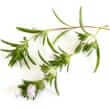Background
- Savory is an aromatic plant used in cooking to enhance flavor. Summer savory (Satureja hortensis) and winter savory (Satureja montana) are the two types most commonly used. A commonly studied constituent is carvacrol.
- Savory is native to the Mediterranean region but has been used across Europe, North America, and South America as a seasoning for meats and salads.
- In traditional medicine, savory is used to treat diarrhea, nausea, cramps, muscle pain, indigestion, and infectious diseases. Limited evidence suggests that savory may help lower cholesterol in diabetics.
References
- Baser KH. Biological and pharmacological activities of carvacrol and carvacrol bearing essential oils. Curr Pharm Des 2008;14(29):3106-19.
View Abstract - Carramiñana JJ, Rota C, Burillo J, et al. Antibacterial efficiency of Spanish Satureja montana essential oil against Listeria monocytogenes among natural flora in minced pork. J Food Prot 2008;71(3):502-8.
View Abstract - Cetojevic-Simin DD, Bogdanovic GM, Cvetkovic DD, et al. Antiproliferative and antimicrobial activity of traditional Kombucha and Satureja montana L. Kombucha. J BUON 2008;13(3):395-401.
View Abstract - Gursoy UK, Gursoy M, Gursoy OV, et al. Anti-biofilm properties of Satureja hortensis L. essential oil against periodontal pathogens. Anaerobe 2009;15(4):164-7.
View Abstract - Lampronti I, Saab AM, Gambari R. Antiproliferative activity of essential oils derived from plants belonging to the Magnoliophyta division. Int J Oncol 2006;29(4):989-95.
View Abstract - Local Food-Nutraceuticals Consortium.Understanding local Mediterranean diets: a multidisciplinary pharmacological and ethnobotanical approach. Pharmacol Res 2005;52(4):353-66.
View Abstract - Oussalah M, Caillet S, Lacroix M. Mechanism of action of Spanish oregano, Chinese cinnamon, and savory essential oils against cell membranes and walls of Escherichia coli O157:H7 and Listeria monocytogenes. J Food Prot 2006;69(5):1046-55.
View Abstract - Razzaghi-Abyaneh M, Shams-Ghahfarokhi M, Yoshinari T, et al. Inhibitory effects of Satureja hortensis L. essential oil on growth and aflatoxin production by Aspergillus parasiticus. Int J Food Microbiol 2008;123(3):228-33.
View Abstract - Redzić SS. The ecological aspect of ethnobotany and ethnopharmacology of population in Bosnia and Herzegovina. Coll Antropol 2007;31(3):869-90.
View Abstract - Rodov V, Vinokur Y, Gogia N, et al. Hydrophilic and lipophilic antioxidant capacities of Georgian spices for meat and their possible health implications. Georgian Med News 2010;(179):61-6.
View Abstract - Skocibusić M, Bezić N. Phytochemical analysis and in vitro antimicrobial activity of two Satureja species essential oils. Phytother Res 2004;18(12):967-70.
View Abstract - Tariku Y, Hymete A, Hailu A, et al. Essential-oil composition, antileishmanial, and toxicity study of Artemisia abyssinica and Satureja punctata ssp. punctata from Ethiopia. Chem Biodivers 2010;7(4):1009-18.
View Abstract - Tzakou O, Skaltsa H. Composition and antibacterial activity of the essential oil of Satureja parnassica subsp parnassica. Planta Med 2003;69(3):282-4.
View Abstract - Vosough-Ghanbari S, Rahimi R, Kharabaf S, et al. Effects of Satureja khuzestanica on Serum Glucose, Lipids and Markers of Oxidative Stress in Patients with Type 2 Diabetes Mellitus: A Double-Blind Randomized Controlled Trial. Evid Based Complement Alternat Med. 2008 Feb 27.
View Abstract - Yazdanparast R, Shahriyary L. Comparative effects of Artemisia dracunculus, Satureja hortensis and Origanum majorana on inhibition of blood platelet adhesion, aggregation and secretion. Vascul Pharmacol 2008;48(1):32-7.
View Abstract







